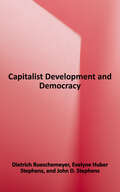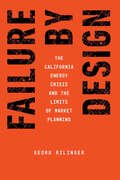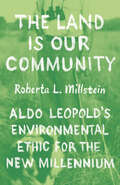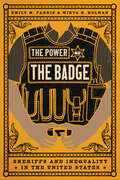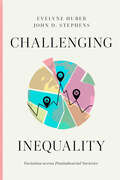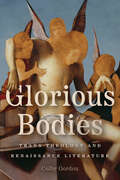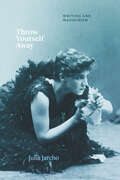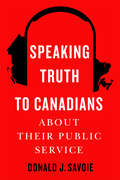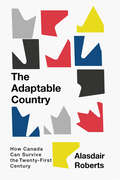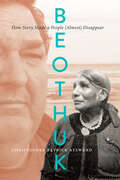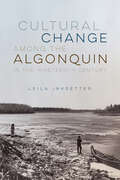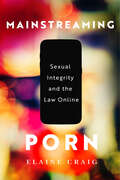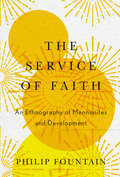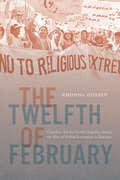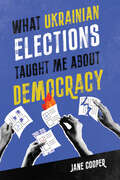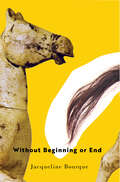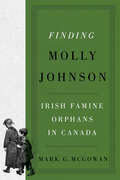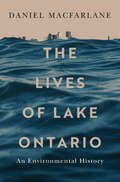- Table View
- List View
Capitalist Development and Democracy
by Dietrich Rueschemeyer John D. Stephens Evelyne Huber StephensIt is a commonplace claim of Western political discourse that capitalist development and democracy go hand in hand. Cross-national statistical research on political democracy supports this claim. By contrast, comparative historical studies carried out within a political economy approach argue that economic development was and is compatible with multiple political forms. The authors offer a fresh and persuasive resolution to the controversy arising out of these contrasting traditions. Focusing on advanced industrial countries, Latin America, and the Caribbean, they find that the rise and persistence of democracy cannot be explained either by an overall structural correspondence between capitalism and democracy or by the role of the bourgeoisie as the agent of democratic reform. Rather, capitalist development is associated with democracy because it transforms the class structure, enlarging the working and middle classes, facilitating their self-organization, and thus making it more difficult for elites to exclude them. Simultaneously, development weakens the landed upper class, democracy's most consistent opponent. The relationship of capitalist development to democracy, however, is not mechanical. As the authors show, it depends on a complex interplay of three clusters of power: the balance of power among social classes, power relations between the state and society, and transnational structures of economic and political power. Looking to the future, the book concludes with some reflections on current prospects for the development of stable democracy in Latin America and Eastern Europe.
And the Garden Is You: Essays on Fieldwork, Writingwork, and Readingwork
by Michael TaussigA new collection of essays reflecting on the centrality of writing anthropological practice from one of the discipline’s most influential thinkers. Michael Taussig’s work is known for its critical insights and bold, experimental style. In the eleven essays in this new collection, Taussig reflects on the act of writing itself, demonstrating its importance for anthropological practice and calling for the discipline to keep experiential knowledge from being extinguished as fieldnotes become scholarship. Setting out to show how this can be done, And the Garden Is You exemplifies a form of exploratory writing that preserves the spontaneity of notes scribbled down in haste. In these essays, the author’s reflections take us from his childhood in Sydney to trips to Afghanistan, Colombia, Finland, Italy, Turkey, and Syria. Along the way, Taussig explores themes of fabulation and provocation that are central to his life’s work, in addition to the thinkers dearest to him—Bataille, Benjamin, Burroughs, and Nietzsche, among others. This collection is vintage Taussig, bound to interest longtime readers and newcomers alike.
Failure by Design: The California Energy Crisis and the Limits of Market Planning
by Georg RilingerA new framework for studying markets as the product of organizational planning and understanding the practical limits of market design. The Western energy crisis was one of the great financial disasters of the past century. The crisis began in April 2000, when price spikes started to rattle California’s electricity markets. Decades later, some blame economic fundamentals and ignorant politicians, while others accuse the energy sellers who raided the markets. In Failure by Design, sociologist Georg Rilinger offers a different explanation, one that focuses on the practical challenges of market design. The unique physical attributes of electricity made it exceedingly difficult to introduce markets into the coordination of the electricity system, so market designers were brought in to construct the infrastructures that coordinate how market participants interact. An exercise in social engineering, these infrastructures were intended to guide market actors toward behavior that would produce optimal market results and facilitate grid management. Yet, though these experts spent their days worrying about incentive misalignment and market manipulation, they unintentionally created a system riddled with opportunities for destructive behavior. Rilinger’s analysis not only illuminates the California energy crisis but also develops a broader theoretical framework for thinking about markets as the products of organizational planning and the limits of social engineering, contributing broadly to sociological and economic thinking about the nature of markets.
Women and Their Warlords: Domesticating Militarism in Modern China
by Kate Merkel-HessExplores the complex history and legacy of elite wives, concubines, and daughters of warlords in twentieth-century China. In Women and Their Warlords, historian Kate Merkel-Hess examines the lives and personalities of the female relatives of the military rulers who governed regions of China from 1916 to 1949. Posing for candid photographs and sitting for interviews, these women did not merely advance male rulers’ agendas. They advocated for social and political changes, gave voice to feminist ideas, and shaped how the public perceived them. As the first publicly political partners in modern China, the wives and concubines of Republican-era warlords changed how people viewed elite women’s engagement in politics. Drawing on popular media sources, including magazine profiles and gossip column items, Merkel-Hess draws unexpected connections between militarism, domestic life, and state power in this insightful new account of gender and authority in twentieth-century China.
The Land Is Our Community: Aldo Leopold’s Environmental Ethic for the New Millennium
by Roberta L. MillsteinA contemporary defense of conservationist Aldo Leopold’s vision for human interaction with the environment. Informed by his experiences as a hunter, forester, wildlife manager, ecologist, conservationist, and professor, Aldo Leopold developed a view he called the land ethic. In a classic essay, published posthumously in A Sand County Almanac, Leopold advocated for an expansion of our ethical obligations beyond the purely human to include what he variously termed the “land community” or the “biotic community”—communities of interdependent humans, nonhuman animals, plants, soils, and waters, understood collectively. This philosophy has been extremely influential in environmental ethics as well as conservation biology and related fields. Using an approach grounded in environmental ethics and the history and philosophy of science, Roberta L. Millstein reexamines Leopold’s land ethic in light of contemporary ecology. Despite the enormous influence of the land ethic, it has sometimes been dismissed as either empirically out of date or ethically flawed. Millstein argues that these dismissals are based on problematic readings of Leopold’s ideas. In this book, she provides new interpretations of the central concepts underlying the land ethic: interdependence, land community, and land health. She also offers a fresh take on of his argument for extending our ethics to include land communities as well as Leopold-inspired guidelines for how the land ethic can steer conservation and restoration policy.
The Power of the Badge: Sheriffs and Inequality in the United States
by Mirya R. Holman Emily M. FarrisA sobering exploration of the near unchecked power of sheriffs in the United States. Across the United States, more than 3,000 sheriffs occupy a unique position in the US political and legal systems. Elected by voters—usually in low-visibility, noncompetitive elections—sheriffs oversee more than a third of law enforcement employees and control almost all local jails. They have the power to both set and administer policies, and they can imprison, harm, and even kill members of their communities. Yet, they enjoy a degree of autonomy not seen by other political officeholders. The Power of the Badge offers an unprecedented, data-rich look into the politics of the office and its effects on local communities. Emily M. Farris and Mirya R. Holman draw on two surveys of sheriffs taken nearly a decade apart, as well as election data, case studies, and administrative data to show how a volatile combination of authority and autonomy has created an environment where sheriffs rarely change; elections seldom create meaningful accountability; employees, budgets, and jails can be used for political gains; marginalized populations can be punished; and reforms fail. Farris and Holman also track the increasingly close linkages between sheriffs and right-wing radical groups in an era of high partisanship and intra-federal conflict.
Challenging Inequality: Variation across Postindustrial Societies
by Evelyne Huber John D. StephensA wide-ranging examination of how policies, parties, and labor strength affect inequality in post-industrial societies. Not all countries are unequal in the same ways or to the same degree. In Challenging Inequality, Evelyne Huber and John D. Stephens analyze different patterns of increasing income inequality in post-industrial societies since the 1980s, assessing the policies and social structures best able to mitigate against the worst effects of market inequality. Combining statistical data analysis from twenty-two countries with a comparative historical analysis of Germany, Spain, Sweden, and the United States, Huber and Stephens identify the factors that drive increases in inequality and shape persistent, marked differences between countries. Their statistical analysis confirms generalizable patterns and in-depth country studies help to further elucidate the processes at work. Challenging Inequality shows how the combination of globalization and skill-biased technological change has led to both labor market dualization and rising unemployment levels, which in turn have had important effects on inequality and poverty. Labor strength—at both the society level and the enterprise level—has helped to counter rising market income inequality, as has a history of strong human capital spending. The generosity of the welfare state remains the most important factor shaping redistribution, while the consistent power of left parties is the common denominator behind both welfare state generosity and human capital investment.
Glorious Bodies: Trans Theology and Renaissance Literature
by Colby GordonA prehistory of transness that recovers early modern theological resources for trans lifeworlds. In this striking contribution to trans history, Colby Gordon challenges the prevailing assumption that trans life is a byproduct of recent medical innovation by locating a cultural imaginary of transition in the religious writing of the English Renaissance. Marking a major intervention in early modern gender studies, Glorious Bodies insists that transition happened, both socially and surgically, hundreds of years before the nineteenth-century advent of sexology. Pairing literary texts by Shakespeare, Webster, Donne, and Milton with a broad range of primary sources, Gordon examines the religious tropes available to early modern subjects for imagining how gender could change. From George Herbert’s invaginated Jesus and Milton’s gestational Adam to the ungendered “glorious body” of the resurrection, early modern theology offers a rich conceptual reservoir of trans imagery. In uncovering early modern trans theology, Glorious Bodies mounts a critique of the broad consensus that secularism is a necessary precondition for trans life, while also combating contemporary transphobia and the right-wing Christian culture war seeking to criminalize transition. Developing a rehabilitative account of theology’s value for positing trans lifeworlds, this book leverages premodern religion to imagine a postsecular transness in the present.
Throw Yourself Away: Writing and Masochism (Thinking Literature)
by Julia JarchoProposes that we can best understand literature’s relationship to sex through a renewed focus on masochism. In a series of readings that engage American and European works of fiction, drama, and theory from the late nineteenth through the early twenty-first centuries, critic and playwright Julia Jarcho argues that these works conceive writing itself as masochistic, and masochism as sexuality enacted in writing. Throw Yourself Away is distinctive in its sustained focus on masochism as an engine of literary production across multiple authors and genres. In particular, Jarcho shows that theater has played a central role in modern erotic fantasies of the literary. Jarcho foregrounds writing as a project of distressed subjects: When masochistic writing is examined as a strategy of response to injurious social systems, it yields a surprisingly feminized—and less uniformly white—image of both masochism and authorship. Ultimately, Jarcho argues that a retheorized concept of masochism helps us understand literature itself as a sex act and shows us how writing can tend to our burdened, desirous bodies. With startling insights into such writers as Henry James, Henrik Ibsen, Mary Gaitskill, and Adrienne Kennedy, Throw Yourself Away furnishes a new masochistic theory of literature itself.
Cave of My Ancestors: Vishwakarma and the Artisans of Ellora
by Kirin NarayanExploring family stories reveals the rich history of a seventh-century Buddhist shrine. As a young girl in Bombay, Kirin Narayan was enthralled by her father’s stories about how their ancestors had made the ancient rock-cut cave temples at Ellora. Recalling those stories as an adult, she was inspired to learn more about the caves, especially the Buddhist worship hall known as the “Vishwakarma cave.” Immersing herself in family history, oral traditions, and works by archaeologists, art historians, scholars of Buddhism, Indologists, and Sanskritists, Narayan set out to answer the question of how this cave came to be venerated as the home of Vishwakarma, the god of making in Hindu and Buddhist traditions. Cave of My Ancestors represents the perfect blend of Narayan’s skills as a researcher and writer. Her quest to trace her family’s stories took her to Ellora; through libraries, archives, and museums around the world; and across disciplinary borders. Equal parts scholarship, detective story, and memoir, Narayan’s book ably leads readers through centuries of history, offering a sensitive meditation on devotion, wonder, and all that connects us to place, family, the past, and the divine.
Partisan Nation: The Dangerous New Logic of American Politics in a Nationalized Era
by Paul Pierson Eric SchicklerA provocative exploration of how America’s democratic crisis is rooted in a dangerous mismatch between our Constitution and today’s nationalized, partisan politics. The ground beneath American political institutions has moved, with national politics subsuming and transforming the local. As a result, American democracy is in trouble. In this paradigm-shifting book, political scientists Paul Pierson and Eric Schickler bring a sharp new perspective to today’s challenges. Attentive to the different coalitions, interests, and incentives that define the Democratic and Republican parties, they show how contemporary polarization emerged in a rapidly nationalizing country and how it differs from polarization in past eras. In earlier periods, three key features of the political landscape—state parties, interest groups, and media—varied locally and reinforced the nation’s stark regional diversity. But this began to change in the 1960s as the two parties assumed clearer ideological identities and the power of the national government expanded, raising the stakes of conflict. Together with technological and economic change, these developments have reconfigured state parties, interest groups, and media in self-reinforcing ways. The result is that today’s polarization is self-perpetuating—and intensifying. Partisan Nation offers a powerful caution. As a result of this polarization, America’s political system is distinctly and acutely vulnerable to an authoritarian movement emerging in the contemporary Republican Party, which has both the motive and the means to exploit America’s unusual Constitutional design. Combining the precision and acuity characteristic of their earlier work, Pierson and Schickler explain what these developments mean for American governance and democracy.
Speaking Truth to Canadians about Their Public Service
by Donald J. SavoieThe federal public service plays a vital role in Canada’s development by helping to shape public policies and deliver programs and services to Canadians. Speaking Truth to Canadians about Their Public Service provides a comprehensive review of the challenges confronting the public service, how the relationship between politicians and career officials has evolved in recent years, and what motivates public servants.Donald Savoie calls on Canadians and their politicians to consider what they want from their federal public service. Answering this question requires a fresh look at the government’s traditional accountability requirements, how policies are shaped, and how government programs and services are delivered. It also requires a review of ambitious modernization and reform measures launched over the past forty years to make the public service more accommodating to political direction and to improve program delivery. Dividing federal public servants into two groups – poets (those who write policy) and plumbers (those who deliver programs and services) – the book establishes who has the upper hand. This division sheds new light on the theories that seek to explain the attitudes and behaviours of career government officials.Amid increasingly strong signs that the public service is in need of a reset, Speaking Truth to Canadians about Their Public Service concludes with practical recommendations to assist Canadians and their politicians in defining what they want their public service to be.
The Adaptable Country: How Canada Can Survive the Twenty-First Century (Canadian Essentials #3)
by Alasdair RobertsShifting geopolitics, regional conflicts, climate change, and technology shocks: these are just some of the factors that will make the twenty-first century dangerous for Canada. Adaptability, the capacity to anticipate and manage dangers, is essential for the country to survive and thrive. But Canada is not as adaptable as it once was.In The Adaptable Country Alasdair Roberts explains what this vital ability means and why we are currently falling short. Politicians, he argues, are overloaded and fixated on the next election. Governments no longer launch big projects to think about the future. Leaders have stopped meeting regularly to discuss national priorities. Technological changes have undermined journalism and the ability of citizens to talk civilly about public affairs. The public service has become less agile because of a decades-long buildup of controls and watchdogs. While in many ways Canada is a better country than it was a generation ago, it is also more complex and harder to govern.The Adaptable Country outlines straightforward reforms to improve adaptability and reminds us about the bigger picture: in a turbulent world, authoritarian rule is a tempting path to security. Canada’s challenge is to show how political systems built to respect diversity and human rights can also respond nimbly to existential threats.
Beothuk: How Story Made a People (Almost) Disappear
by Christopher Patrick AylwardThe well-known story of the Beothuk is that they were an isolated people who, through conflict with Newfoundland settlers and Mi’kmaq, were made extinct in 1829. Narratives about the disappearance of the Beothuk and the reasons for their supposed extinction soon became entrenched in historical accounts and the popular imagination.Beothuk explores how the history of a people has been misrepresented by the stories of outsiders writing to serve their own interests – from Viking sagas to the accounts of European explorers to the work of early twentieth-century anthropologists. Drawing on narrative theory and the philosophy of history, Christopher Aylward lays bare the limitations of the accepted Beothuk story, which perpetuated but could never prove the notion of Beothuk extinction. Only with the integration of Indigenous perspectives, beginning in the 1920s, was this accepted story seriously questioned. With the accumulation of new sources and methods – archaeological evidence, previously unexplored British and French accounts, Mi’kmaq oral history, and the testimonies of Labrador Innu and Beothuk descendants – a new historical reality has emerged.Rigorous and compelling, Beothuk demonstrates the enduring power of stories to shape our understanding of the past and the impossibility of writing Indigenous history without Indigenous storytellers.
Cultural Change among the Algonquin in the Nineteenth Century (McGill-Queen's Indigenous and Northern Studies)
by Leila InksetterThe nineteenth century was a time of upheaval for the Algonquin people. As they came into more sustained contact with fur traders, missionaries, settlers, and other outside agents, their ways of life were disrupted and forever changed. Yet the Algonquin were not entirely without control over the cultural change that confronted them in this period. Where the opportunity arose, they adapted by making decisions and choices according to their own interests.Cultural Change among the Algonquin in the Nineteenth Century traces the history of settler-Indigenous encounter in two areas around the modern Ontario-Quebec border, in the period after colonial incursion but before the full effects of the Indian Act of 1876 were felt. While Lake Timiskaming was the site of commercial logging operations beginning in the 1830s, the Lake Abitibi region had much less contact with outsiders until the early twentieth century. These different timelines permit comparison of social and cultural change among Indigenous peoples of these two regions. Drawing on nineteenth-century archival sources and twentieth-century ethnographic accounts, Leila Inksetter sheds new light on band formation and governance, the introduction of elected chiefs, food provisioning, environmental changes, and the interaction between Indigenous spirituality and Catholicism.Cultural change among the nineteenth-century Algonquin was experienced not only as an uninvited imposition from outside but as a dynamic response to new circumstances by Indigenous people themselves. Inksetter makes a case for greater recognition of Algonquin agency and decision making in this period before the implementation of the Indian Act.
The Hour of Absinthe: A Cultural History of France's Most Notorious Drink (Intoxicating Histories #11)
by Nina S. StuderAt the height of its popularity in the late nineteenth century, absinthe reigned in the bars, cafés, and restaurants of France and its colonial empire. Yet by the time it was banned in 1915, the famous green fairy had become the green peril, feared for its connection with declining birth rates and its apparent capacity to induce degeneration, madness, and murderous rage in its consumers.As one of history’s most notorious drinks, absinthe has been the subject of myth, scandal, and controversy. The Hour of Absinthe explores how this mythologizing led to the creation and fabrication of a vast modern folklore while key historical events, crucial to understanding the story of absinthe, have been neglected or unreported. Mystique and moralizing both arose from the spirit’s relationship with empire. Some claim that French soldiers were given daily absinthe rations during France’s military conquest of Algeria to protect them against heat, diseases, and contaminated water. In fact, the overenthusiastic adoption of the drink by these soldiers, and subsequently by French settlers, was perceived as a threat to France’s colonial ambitions – an anxiety that migrated into French medicine.Providing keen insight into how local cultural narratives about absinthe shaped what quickly became a global reputation, Nina Studer provides a panoptic view of the French Empire’s influence on absinthe’s spectacular fall from grace.
Political Culture in Louis XIV’s Canada: Majesty, Ritual, and Rhetoric (McGill-Queen's French Atlantic Worlds Series #8)
by Colin M. CoatesIn Louis XIV’s New France, colonial authorities attempted to reproduce French regal authority in novel ways, often by performing typical metropolitan political rituals. When these practices were transposed into the St Lawrence Valley settlements, where a small French population lived alongside a substantial Indigenous presence, they took on new meanings.The colony of Canada replicated many features of the developing French absolutist state. Yet while the king likely knew more about his colony than he did about most parts of metropolitan France, this transatlantic setting imposed new constraints on absolutist authority, from the challenges of distance to an Indigenous population that largely lived outside European norms. Political Culture in Louis XIV’s Canada examines royal power as it was represented in ritual (ceremonial entrances, Te Deums, processions), in rhetoric (political disputes over cabals and factions), and in objects (portraits, royal busts, currency, buildings, maps, and censuses). Colin Coates describes the successes and failures the French authorities experienced in exporting their political practices. He reveals how those authorities’ understandings of Indigenous political culture shaped ideas of the proper relation between rulers and the ruled.This book traces the establishment of a colonial political culture that continued to shape the lives of the French in Canada long after the Sun King’s death in 1715.
Mainstreaming Porn: Sexual Integrity and the Law Online
by Elaine CraigThe ubiquity of streaming sites such as Pornhub has transformed the social role of sexually explicit content today. Online porn is no longer a shady corner of the internet; it is mainstream. Its production, commodification, and consumption on data-driven online platforms has changed – and is changing – our personal relationships, social and legal systems, and sexual norms.Online porn platforms are shaping sexual desires and practices in the same way that Google and Facebook have affected social relationships and the circulation of information: porn is now consumed on data-driven platforms with algorithms designed to engage the attention of users, encourage the production of user-generated videos, and filter content. Through frank examination of mainstream content with themes of incest, intoxication, and so-called consensual rough sex, issues that play out in life and in court, Elaine Craig shows how the platformization of mainstream pornography is shaping our sexual culture in real time. Mainstreaming Porn maps a complicated web of legal culture and legal actors, from corporate lawyers and platform content regulation to the criminal, civil, and administrative contexts in which porn companies operate and the legal interpretation of sexual assault defences. All have profound implications for the promotion and protection of everyone’s sexual integrity, and especially that of women and girls.Mainstreaming Porn is an unflinching, carefully balanced perspective on a divisive topic. Without demonizing pornography or its consumption, Craig makes a powerful argument for applying legal mechanisms to corporate-owned online platforms while offering a sober evaluation of the limits of the law in governing pervasive cultural norms and social understandings of sexuality.
Reckoning with History: Essays on Uses of the Past
by K.J. Kesselring and Matthew NeufeldBringing together essays on uses of history as both a practical activity and an approach to thinking about the present, this collection explores ways in which people have reckoned with history in pasts both distant and near.Reckoning with History begins by examining uses of the past in early modern Britain, a period in which print, religious reformation, and political conflict transformed historical culture. Later essays offer insights into personal, popular, professional, and sometimes deeply political uses of the past in other times and places, helping to contextualize our own moments in historical writing and to link the early and post-modern periods. Throughout, contributors respond to the writings of Daniel Woolf, whose scholarship illuminates the history of the historical discipline and the social circulation of the past.Covering subjects such as early archival practices, memories of historic plagues, and the type of commemorations needed to revitalize liberal democracies, Reckoning with History contextualizes the uses of the past today.
The Service of Faith: An Ethnography of Mennonites and Development
by Philip FountainFounded over a century ago, the Mennonite Central Committee (MCC) is regarded as one of the most important institutional carriers of Canadian and American Mennonite identity. Generations of Mennonites and others have served with the organization, carrying out development, disaster relief, and peacebuilding work in over fifty countries globally. The Service of Faith offers an ethnography of MCC’s Christian development work in Indonesia, exploring the challenges, conundrums, theologies, and ethical commitments that shape Mennonite service.The success of religious-based development work depends on effectively bridging very different cultural and religious worlds. Braiding together extensive ethnographic and archival research, Philip Fountain analyzes MCC’s practices of cultural translation in the Indonesian context. While the particularities of Mennonite religious values are deeply influential for MCC’s work, in practice its humanitarian project involves collaboration with a range of actors who come from widely varied religious positions. In taking a nuanced, case-specific approach to understanding how faith shapes moral projects, Fountain challenges mainstream claims to secular neutrality and the tendency to dismiss or disapprove of religious motivations in development work.Exploring the diverse ways in which Mennonite convictions permeate MCC’s work in Indonesia, The Service of Faith confronts the question of whether religion has a legitimate place in international development work.
The Twelfth of February: Canadian Aid for Gender Equality during the Rise of Violent Extremism in Pakistan (McGill-Queen's/Brian Mulroney Institute of Government Studies in Leadership, Public Policy, and Governance #17)
by Rhonda GossenPakistan has been a priority country for international development assistance since the early years of its creation. Though Pakistan celebrates National Women’s Day on 12 February each year to commemorate the 1983 women’s march, three decades of war in neighbouring Afghanistan have stoked violent extremism and constrained development gains and gender equality. Canada led the first global efforts to support women’s rights and gender equality in the region.The Twelfth of February tells the story of the Canadian International Development Agency’s support for women’s organizations and civil society in Pakistan. Rhonda Gossen traces the ebbs and flows of financial aid, drawing on her own unique experience as a development worker as well as compelling interviews with activists, non-governmental organizations, officials, and diplomats. She assesses how women’s organizations work to resist violent extremism and makes the connection between gender inequality and security threats in a volatile region. Despite the influence of Islamic extremism, the gender equality movement in collaboration with civil society in Pakistan did make tangible headway.The Twelfth of February addresses a problem that is all too timely: given violent extremism’s devastating impact on development gains including women’s rights, security , and the elimination of gender-based violence, what is the future role for international development?
What Ukrainian Elections Taught Me about Democracy (Footprints Series #30)
by Jane CooperWin the votes, buy the votes, steal the votes, invalidate the votes! There is a lot that can go right – and so much that can go wrong – in a Ukrainian election. From the opening of the campaign through to the final decision on the results, it is a rollercoaster ride for the candidates, the election workers, and the international observers who have travelled from afar to see it all.In What Ukrainian Elections Taught Me about Democracy long-time election observer Jane Cooper recounts her experience monitoring a municipal election in the mid-sized city of Kirovohrad in 2015. Offering a practical framework for exploring the many things that can go right or wrong during an election, at the core of this story is the inspirational struggle of the poll workers at the bottom of the electoral pyramid to keep the election honest. Cooper describes how election results can be manipulated or falsified and how attempts to do so can be frustrated, providing lessons for citizens of every democratic country. The first work written from the perspective of a Canadian international election observer, the book is an accessible and entertaining story that will appeal to election specialists and the ordinary Canadians who work at the polls on election day, as well as readers who want to learn more about the democratic process in present-day Ukraine.The war in Ukraine has shown us just how endangered democracy is. What Ukrainian Elections Taught Me about Democracy is an insider’s view of election monitoring that sheds light on Canada’s support for international democracy.
Without Beginning or End (Hugh MacLennan Poetry Series #86)
by Jacqueline BourqueIn my palliative months / the cormorant leaves me / at peace, disintegrating / with the exhalation of a BuddhaWithout Beginning or End is Jacqueline Bourque’s final testament to a life well lived, written in the wake of a terminal cancer diagnosis.Deeply inspired by her Acadian upbringing along the ocean shores of New Brunswick, these are poems populated by aerialists, painters, and the spirit of Charles Baudelaire, who connects the poet to “the ligatures of life.” Those ligatures in turn connect her with family in the collection’s remarkable title suite, bringing new life to a past that continues to resonate in the present.Without Beginning or End is a book about love, friendship, art, and the human condition. Beautiful, and poignantly human, it is an emotionally charged parting gift to loved ones and readers alike.
Finding Molly Johnson: Irish Famine Orphans in Canada (McGill-Queen's Studies in the History of Religion #100)
by Mark G. McGowanIreland’s Great Famine produced Europe’s worst refugee crisis of the nineteenth century. More than 1.5 million people left Ireland, many ending up in Canada. Among the most vulnerable were nearly 1,700 orphaned children who now found themselves destitute in an unfamiliar place. The story Canada likes to tell is that these orphans were adopted by benevolent families and that they readily adapted to their new lives, but this happy ending is mostly a myth.In Finding Molly Johnson Mark McGowan traces what happened to these children. In the absence of state support, the Catholic and Protestant churches worked together to become the orphans’ principal caregivers. The children were gathered, fed, schooled, and placed in family homes in Saint John, Quebec, Montreal, Bytown, Kingston, and Toronto. Yet most were not considered members of their placement families, but rather sources of cheap labour. Many fled their placements, joining thousands of other Irish refugees on the Canadian frontier searching for work, extended family, and the opportunity to begin a new life.Finding Molly Johnson revisits an important chapter of the Irish emigrant experience, revealing that the story of Canada’s acceptance of the famine orphans is a product of national myth-making that obscures both the hardship the children endured and the agency they ultimately expressed.
The Lives of Lake Ontario: An Environmental History (McGill-Queen's Rural, Wildland, and Resource Studies #17)
by Daniel MacfarlaneLake Ontario has profoundly influenced the historical evolution of North America. For centuries it has enabled and enriched the societies that crowd¬ed its edges, from fertile agricultural landscapes to energy production systems to sprawling cities.In The Lives of Lake Ontario Daniel Macfarlane details the lake’s relationship with the Indigenous nations, settler cultures, and modern countries that have occupied its shores. He examines the myriad ways Canada and the United States have used and abused this resource: through dams and canals, drinking water and sewage, trash and pollution, fish and foreign species, industry and manufacturing, urbanization and infrastructure, population growth and biodiversity loss. Serving as both bridge and buffer between the two countries, Lake Ontario came to host Canada’s largest megalopolis. Yet its transborder exploitation exacted a tremendous ecological cost, leading people to abandon the lake. Innovative regulations in the later twentieth century, such as the Great Lakes Water Quality Agreements, have partially improved Lake Ontario’s health.Despite signs that communities are reengaging with Lake Ontario, it remains the most degraded of the Great Lakes, with new and old problems alike exacerbated by climate change. The Lives of Lake Ontario demonstrates that this lake is both remarkably resilient and uniquely vulnerable.
